Pastor Jerry Morrell was not playing to his audience. “I was asked if Donald Trump is a man of God,” the evangelical preacher told the congregation of The Way of Holiness church on the outskirts of Buckhannon, West Virginia. “I said: ‘No, I don’t see him as a man of God. Or, at this point, a godly man. I think he’s a man whose heart can be touched by God. I think he may be open to that’.”
A silence fell. The cries of acclamation greeting much of the Pentecostal pastor’s sermon drained away.
“Y’all got real quiet when I said that but I have to tell it like it is,” Morrell pressed on. “I’m praying for our president. Let him have the wisdom not to say some things and not to put some things out on Twitter,” he said. “We ask you to set a guard over Mr Trump’s mouth and Twitter”.
On that, there was agreement. Eighty percent of white evangelicals backed Trump for president, but worshippers at The Way of Holiness church were not without their doubts.
“To be honest with you, I voted for Trump but if I’d had another choice I probably would not have,” said Thrayron Morgan, a grandmother from a military family attending church that day. I pointed out there was another choice: Hillary Clinton. “No! That’s not my other choice. We’ve had enough of that,” she said with a laugh. “It was very difficult for me. Very difficult. In fact it was a toss-up between not voting at all and voting for him. I really had to pray about that.”
Morgan had lots of problems with Trump but a big one was the way he spoke about women and immigrants. “I don’t think he should talk about people like that. Even the homosexuals, you hate the sin not the sinner. As a Christian, I don’t believe in treating people the way he treated some people,” she said.
Morgan’s mind was made up by the supreme court. She wants to see a court “following Godly principles” and she had little doubt that Clinton would have nominated the wrong kind of justices. “That’s important to me. On abortion number one. Same-sex marriage. Anything to do with either one of those. And I have a feeling there may be some issues come up even later that may touch on Christian principles too. I have no clue what, but you never know when something might come up that’s against my beliefs,” she said.
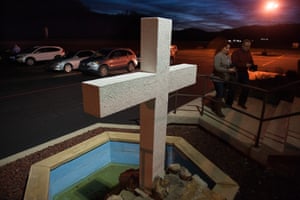
In parts of West Virginia, it is said there are two reasons to vote: God and coal. Both have been in retreat for years. In a state where families still pray at the restaurant dinner table, and mines were once the engine of prosperity, Trump won with the promise of revival.
But there’s a paradox. Evangelicals may doubt Trump’s commitment to God, but they calculate he will be good for their push to inject more religion into American life. On the other hand, those who voted for Trump because he promised to bring back coalmines often admire his business skills – but they do have doubts about whether he can deliver.
So far, conservative Christians have not had reason to be disappointed. Trump’s appointment of evangelicals to his cabinet – including an attorney general who advocates an end to the wall between church and state, and an education secretary who wants to “advance God’s kingdom” through public funding of religious schools – has sent the right signals. And just in case Trump veers off course, evangelicals are counting on Mike Pence, an advocate of teaching creationism alongside Darwinism, to steer the president straight.
“We are very much right-to-life people and Trump seems to be more favorable toward that point of view than former administrations,” said Morrell. “We love people of all beliefs and backgrounds, and yet we also want to have the liberty of believing marriage is between a man and a woman, and to hold to that conviction without being sued for discrimination. Sometimes that’s painted in such a negative way when it used to be everyone’s view. Sometimes on the right we’re painted as racists and bigots and haters. We’re not, but we want to be allowed to hold to traditional values.”
The pastor acknowledges that Trump does not live by those same values. Of the president’s boasting about touching women’s genitals, he said that “it bothered me tremendously. I’m a father of four daughters and I have a lovely wife I want to be respected. But I attribute that to being in his past,” he said. “I do wish he would do a better job of reaching out to his opposition and not lashing out. I do believe we need to work together as a nation regardless of our beliefs. I really am concerned about the racial strife that has gotten worse over the last eight years.”
For that, Morrell blames Barack Obama. “The former administration, in continually emphasizing our differences instead of what we have in common, created an us and them atmosphere, and it has happened not only racially but among political parties and on the lines of wealth and poor. It’s been us and them when it needs to be us as Americans,” the pastor said.
Obama, ‘the man who killed the mines’
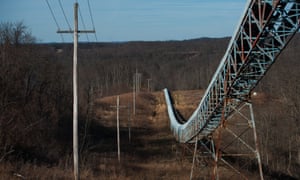
Obama gets blamed for a lot more: his remarks about working-class people clinging to religion and guns during his first run for the White House festered right through his presidency. And, more than anything, he became known as the man who killed the mines.
It’s an article of faith in West Virginia that Obama’s “war on coal” put mines out of business. The industry helped push the claim by resisting Environmental Protection Agency regulations, which are widely viewed as a plot to make coalmining unviable.
Trump, on the other hand, promised to revive the mines that once provided a good living for much of this part of Appalachia. On 28 March, he signed orders rolling back measures to combat global warming, including pollution restrictions on coal-fired power plants and lifting a moratorium on new coal leases on federal lands in an effort to boost the mining industry. The move came days after he told a rally in Kentucky that he was rolling back regulations: “We are going to put our coalminers back to work.”
In the southern part of the state, people are already talking about how more coal trucks are on the move. But a good number of Trump supporters doubt the mines will ever be revived: they just don’t see the economics working. Still, they back Trump because he talked about their problems when they feel virtually invisible to the national political class. More than a few supported Bernie Sanders for the same reason.
Robin Jeran, who ran the kind of small-scale mines that once dotted West Virginia, voted for Trump but he doubts coal is making a comeback. “We were very fortunate through the years to be able to work steady, but as time went on I could see it coming. The little guy’s going to get squeezed out. You don’t have the money behind you to stay in business when they keep passing more stringent laws,” he said.
Jeran’s family ran 10 mines over nearly three decades. Mostly they dug several hundred feet into a hillside, employing a few dozen miners at a time. When one mine’s coal was exhausted, usually within three or four years, they moved on to another. Back then, coal provided a decent wage. “Decent income. Health benefits,” said Jeran. “At one time we used to say that for every guy that you employed there was another eight or 10 people out there in service industries that supplied you that you fed.”
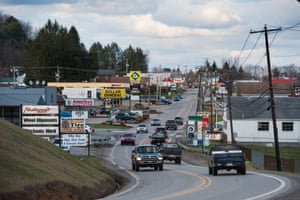
Jeran went out of business in 2009, the year Obama moved into the White House. He said his mines were killed by a confluence of low coal prices, falling demand, competition from natural gas and increased regulation, particularly after two local mine disasters. In 2006, 12 miners were killed in an explosion at the deep Sago mine just outside Buckhannon – an operation owned by Wilbur Ross, a billionaire banker who is now Trump’s commerce secretary. Four years later, 29 men died in a coal dust explosion at the Upper Big Branch mine. The tragedies prompted new state safety regulations after it was revealed that both mines were repeatedly cited for violations. The new measures included the building of underground emergency shelters.
Jeran said it was one cost too many for small mines like his. “At the time I never thought we needed any of that stuff. Still don’t. They made us spend hoards of money on shelters underground. Communication devices. Tracking devices. They can’t prove it’s saved any lives, any of this stuff. But it really added tremendous costs to a small coalmine because everybody had to have the same stuff no matter how small you were,” he said. He calculates that regulation added several dollars to a ton of coal at a time when prices were rock bottom, driving his and other mines out of business.
Then came Obama. The president did not begin coal’s troubles, but the former mine owner reckons he put the final nail in the coffin of small-scale operations with environmental regulations. “He definitely destroyed the coal business. He made up his mind to do it,” he said.
But Jeran doubts that Trump, for all his promises, can reverse the long-term decline.
“To me there’ll always be some work for coal but I don’t ever see it coming back the way it did,” he said. “Most of the good easy coal to mine in West Virginia is long gone so everything is more difficult, deeper, lot more rock in the coal seams. As they keep changing the power plants from coal to gas, and the gas has gotten so cheap, I think the gas is going to work the coalminers out now.”
The loss of the mines is keenly felt. Jeran’s workers typically earned more than $80,000 a year. In the 1970s, pay in West Virginia was above the national average. By the turn of the millennium, with mining collapsing, wages had fallen far behind most of America and low-paying Walmart was the state’s biggest employer.
The numbers of people dependent on welfare, including food stamps, rose. Nearly 15% of West Virginia residents receive disability payments, the highest of any state. The mine at Sago closed, leaving behind the hoists and headgear as markers of what once was, and a black granite memorial in the town to the dead. Other small towns just a few miles outside of Buckhannon are grappling with the consequences of lost mines as mortgage foreclosures and bankruptcies drove people from their homes and businesses.
Jeran readily admits that he does not know what the solution is, but he likes the idea of the government in the hands of a businessman with a focus on what’s good for Americans. “The government wastes so much money it’s unbelievable. It just drives you crazy. We’re out trying to save the world all the time and we don’t take care of our own. We shouldn’t have people starving, homeless. Let’s shrink it back in and take care of us. My golly, this idea that we’re the know it all, good all hasn’t proved out. All we do is get our foot in the door, get a whole bunch of people killed, defending what? What have we accomplished in Afghanistan or any of these places?”
‘Fuck the United States. They’re the most cruelest country there is’
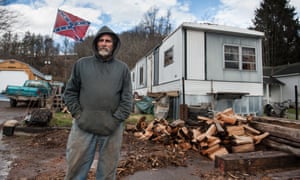
The belief that America’s leaders have been more interested in foreign adventures than looking after those at the bottom of the pile back home runs through many West Virginia communities.
Ricky Farnsworth flies a Confederate battle flag from an improvised steel rod flagpole outside his trailer home. When I ask why he’s hoisted such a divisive symbol in a state mostly carved out of Virginia to join the Union cause, he smiles.
“I will not fly an American flag other than that one. I would rather have a Chinese flag, a Japanese flag, a Russian flag. Fuck the United States. They’re the most cruelest country there is. Letting your own people starve and sending aid overseas. Going over and killing people in other countries and then building them back up. What business did we have in Vietnam? What business did we have in Iraq?” he said.
Farnsworth used to work on oil rigs but the toll of injuries, including a lost finger, and the general wearing down of his body forced him out of a job. Now, at 59, he lives on a little more than a $1,000 a month in disability payments. Farnsworth is an unflinching if maverick Trump supporter. He denounces the rich but believes the billionaire president will Make America Great Again. He speaks of Obama as “the black guy” and said he knows for sure the former president is not American. Yet he supports Obamacare and doesn’t understand why the US can’t replicate Canada’s health system.
“Money don’t excite me. I don’t worry about it even though I don’t have it. I don’t hardly buy food because it’s too damn expensive,” he said. “I go to the diner and eat a little bit. Two beets, a half spoonful of bacon bits, a half spoonful of shredded cheese. I’ll put a little bit of coleslaw, a little bit of cottage cheese. Four peaches. I’ll eat that. I ate that yesterday. I ain’t eaten nothing since that. I won’t eat nothing today. That’s what I live on.” That and a steady supply of chewing tobacco.
Farnsworth sees Trump’s wealth as evidence that he is looking out for ordinary Americans.
“Why would he downgrade himself if he didn’t want to help the United States? His home was more valuable than the White House,” he said.
The retired oil worker regards taxes with the same scorn as much of conservative America, although his objection comes with a twist not so often heard among Republicans. Why, he asks, should the poor pay taxes when the rich don’t contribute their fair share? Yet Farnsworth doesn’t blame Trump for avoiding taxes with his business manoeuverings.
“He didn’t pay taxes but he went by the law. He did not steal off the government. He went by the law because he was a smart man,” he said.
Still, Farnsworth isn’t keen to let the point go. He doesn’t see why the Internal Revenue Service is making demands of a man like himself getting by hand to mouth.
“Why don’t they go and get their money from the billions they spent in Iraq?”
‘I did not join the army to act as a mercenary for oil’

Like evangelicals, a clear majority of military veterans voted for Trump. Sergeant Ron Frye wasn’t one of them. The 48-year-old army veteran stepped on a booby trap in Iraq in 2003. He spent eight months in a coma, lost the use of his legs and is now in a wheelchair. It has left him in unending pain.
“I understood Afghanistan. Iraq, I never understood why we were there. I know why the president claimed we went to Iraq but there were so many shady background issues involved in it that I’ve just come to believe that the only reason we went to Iraq was all about money and oil. I joined the army to protect America and preserve freedom for those around the world who asked for our assistance. I did not join the army to act as a mercenary for oil,” he said.
“When I came back from Iraq after I got blown up, I swore I would never vote for another Republican because they’d already stolen my legs. So I supported Barack Obama. I thought he was the second coming of JFK. Well into his first term, I realised I was sadly mistaken so I said I would never support the Democratic party again,” he said.
Then came the 2016 election. “I looked at it and said you can vote for the Wicked Witch of the West or you can vote for the King of the Oompa-Loompas. I finally decided on Clinton because I thought in a politically savvy sense she was far more qualified than Donald Trump. I saw how the country voted and I thought, oh my God. At first I was inclined to think we’ve elected the second Adolf Hitler.”
Frye lives in a small house on a street populated by veterans who served as far back as the second world war. His views are not widely shared either among his neighbours or many others in Buckhannon.
“I’m a loud, egotistical, self-centred cripple and I can say anything I want and nobody can do a damn thing about it because then they would be seen as being the guy who picks on the wounded vet,” he said. “It’s the only liberating thing about being in a wheelchair, being able to state whatever I want, however I want, without anybody trying to shout me down.”
Frye said he will give Trump six months to see if the new president is as bad as he fears, but he’s not getting his hopes up. “He’s stirred up so much animosity that unless you came over on the Mayflower you cannot be sure you’re not going to get targeted by him,” he said. “To have fought for freedom, equality, democracy – all these things held so dear – and then to have somebody being elected who seems to support the exact opposite of that – hatred, inequality, the segregation … It’s as if we’re taking a step back to the 1950s.”
Frye fears that might also apply to policies toward working conditions and the environment. He lost family in the Sago mine disaster. One of his wife’s cousins, Fred Ware, was asphyxiated and another, Randal McCloy, was the sole survivor and permanently injured.
“I’m not out to save the whales and I’m not out to hug a bunch of trees. But I certainly don’t want my children to live the way I had to live, growing up in an Irish family in West Virginia, working in the coalmines. I don’t want to see any more of my relatives die of black lung,” he said. “I would love to see economic growth for West Virginia. I just don’t want to see economic growth for West Virginia at the cost of West Virginia itself. There has to be a middle ground and in America finding a middle ground is probably far more difficult than any other country.”
‘Now those with the most fear those with the least’
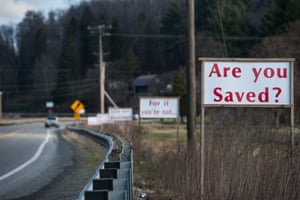
West Virginia was once solidly Democratic. Although Trump won every county, the state has not entirely turned its back on the party. A Democrat, Jim Justice, was elected governor in the same ballot, although it helped that he is a conservative billionaire mine owner. Democrats also hold five of the six directly elected offices including secretary of state. But the GOP tide is pushing in. A Republican was elected to one of the seats in the US Senate in 2015 for the first time in 60 years and all three of the state’s seats in Congress have flipped to the party since the turn of the millennium.
“There’s always been a class and caste system. America’s supposed to be the class-free country. The only thing is the classes here have to be far more subtle,” said Frye, the veteran. “Now those with the most fear those with the least. And while saying that we need to equalize the system they spend all their time and resources secretly distancing themselves more to protect themselves from the hatred of the faceless majority.”
Jeran, the former mine owner, reckons West Virginia should naturally lean to the Democrats. He blames Obama’s policies for the party’s fall, although he said the former president’s race contributed to the hostility towards him.
Still, there’s one Obama legacy a lot of West Virginians are not keen to see erased. Farnsworth, the Trump supporter, liked Obama’s healthcare reform although he would like to have seen it go further. “The US can afford for everyone to have insurance. Canada does and these other smaller countries that ain’t as rich, they can do that. Why can’t the US? Because it’s too mean. Highfalutin motherfuckers in the government wants to send all this aid and stuff overseas,” he said.
Jeran broadly backed Obamacare. He said it’s flawed but he doesn’t want to see it swept away without an alternative. “It was a good thing for people that wanted to get insurance and get it at a reasonable price. I had Obamacare when I quit for a couple of years but these insurance companies they just change stuff and they jack it up. Same with pharmacy. The drug prices in this country, it just drives you crazy,” he said. “To me, you gotta do something. This idea that we’re just going to get rid of Obamacare and we don’t have anything in place, I don’t like that.”
As for Making America Great Again, Sgt Frye is doubtful. “America never stopped being great. America stopped believing in itself and caring about itself,” he said. “We became so disgruntled and bitter and concentrated on the fact that our politicians were a bunch of lying, conniving scum that we ceased having pride in our country’s achievements and became focused on our failures. Until we learn to start being proud of the positive things we achieve, we will never be great again in our own eyes. And if you cannot love yourself, how can anyone else love you?”
That’s a sentiment Morgan, the evangelical and conservative grandmother, agrees with – although she sees it through a different prism.
“We’ve really turned away from God as a nation and when a nation does that, God has a hard time blessing a nation that is turning its back on him,” she said. “I want to bring God back into our government. I know church and state to a point needs to be separated but I think it needs to come together too in order for God to bless the nation. I want to see prayer in school. Bring back those things that have been removed so that the next generation are taught godly principles.”
Morgan realises that’s a big ask, but she thinks Trump may be the man to make it happen. For all that, she can’t decide if he’s a religious man or just an opportunist.
“That’s up in the air, in my opinion. I don’t know depending on what day you ask me,” she said.










